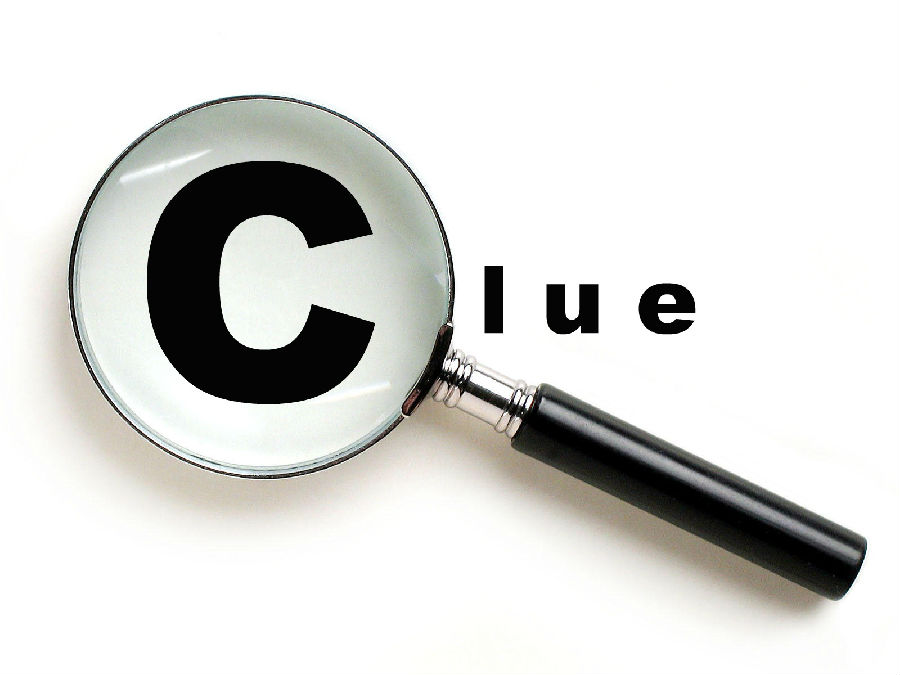(单词翻译:单击)
听力文本
Now, Words and Their Stories from VOA Learning English.
On this program we talk about words and expressions that we use in everyday conversation. Today we are going to talk about mysteries. And, more importantly, how to solve them.
So, what are the keys to solving a mystery? If you said clues, you are right. Clues are pieces of information that help you find an answer.
The word "clue" has an origin story that may surprise both native English speakers and those learning English. The origin of the word combines a Greek myth, a labyrinth, danger and knitting.

That's right, knitting!
But first, let's start with the myth. In this story, a monster called the Minotaur lived in a labyrinth on the island of Crete. From time to time, people were sent inside the labyrinth as sacrifices. They could not find their way out, and the Minotaur killed and ate them.
Except for one man.
As the story goes, Theseus volunteered to go into the Minotaur's labyrinth. But before going in, Theseus unraveled a ball of yarn. He battled the Minotaur and killed it. Then he followed the yarn back to the opening of the labyrinth and came out alive.
You may be saying to yourself, "That is a great story. But what does it have to do with the word 'clue'?"
Well, in the 1590s, a ball of yarn was called a clew, spelled c-l-e-w. Because of this Greek myth about Theseus -- and possibly other stories, too -- the meaning of "clew" began to change. By the 1620s, the word meant something that will lead to a solution. After more time passed, the spelling changed to c-l-u-e, the way we spell it today.
"Clue" continued to become even more widely used.
By the late 1940s, someone who didn't have a clue meant someone who didn't understand something. Today, we commonly use this "clue" in many expressions. You can use it to talk about someone who doesn't know a specific thing or about someone who is generally ignorant.
For example, I am organizing a surprise birthday party for my friend. She doesn't have a clue what I am planning! When the guests jump out of their hiding places and yell "Surprise!" she will be shocked.
That is a friendly use of the expression. But it can also be used in a more critical way.
For example, I could say, "I have a friend who was born into a very rich family. I feel uncomfortable when she complains about people who struggle to pay their bills on time. She doesn't have a clue how hard it can be to make a living!"
Instead of "didn't have a clue" you could also say "she is clueless" for both of these examples.
Here's another example of "clueless" meaning a general state of ignorance.
"I can't believe the boss made his son our manager. That kid is so clueless. He has no idea how this company works. We're doomed!"
That's an insult.
Now, if someone is clueless or doesn't have a clue in the sense that he or she is simply ignorant, you can tell them angrily to get a clue. This like telling them to wake up or to get with it!
You can also gently clue them in. This phrase means to let someone know the way something happens. We often use it when something is difficult to understand or see on the surface.
So, if you are simply sharing your homemade apple pie recipe with a friend, you probably wouldn't say, "I'll clue you in on how to make this apple pie." I mean, you could say that. But it sounds much too dramatic.
But let's say a friend of yours moves into the apartment building where you live. Many strange and difficult people also live in that building. You might want to pull your friend aside and say, "Look, if you want to be happy here, let me clue you in on some of the characters who live here. Never talk directly to the guy who walks his turtle. If you need to say something to him, just say it to the turtle. And don't hang your laundry on your balcony. The woman living above you will shoot at your dry clothes with a water gun. And whatever you do, DO NOT play classical music after 6 p.m. Your next door neighbor was a conductor in an orchestra and misses it terribly. You will hear him crying for hours afterward."
Now, I hope you feel a bit clued in on the different ways to use the word "clue."
And that's all for this Words and Their Stories.
I'm Anna Matteo.
重点解析
1.from time to time 有时;不时;不时地
From time to time suggest roommate who wanted to tell her to see a doctor.
我们不时暗示那位舍友,想告诉她要去看医生了。
2.as the story goes 据说
As the story goes, he has been promoted twice in five years.
据说他在五年中升迁了两次。
3.clue sb in on 提示某人
Please clue me in on his girlfriend.
请告诉我有关他女朋友的事。
参考译文
现在是VOA学英语《词汇掌故》节目时间。
在本节目中,我们会谈论日常交际中使用的单词和表达。今天我们要聊的是谜团(mysteries)。更重要的是,解开这些谜团。
那么,解开谜团的关键是什么呢?如果你回答线索(clues),你答对了。“clues”是帮助你找到答案的信息。
单词“clue”的来源也许会让英语是母语的人以及那些英语学习者感到意外。这个单词的来源牵涉到希腊神话、迷宫(labyrinth)、危险和编织物(knitting)。
对的,编织物!
但让我们先从神话开始说起。在这个神话中,一个叫弥诺陶洛斯(Minotaur)的怪兽住在克里特岛上的一个迷宫里。时不时会有人被当做祭品(sacrifices)送入迷宫。他们在迷宫里找不到出路,于是弥诺陶洛斯杀死他们并吃掉这些人。
有个人例外。
据说(as the story goes),忒修斯(Theseus)自愿进入迷宫。但是忒修斯在进去之前,他解开了一团纱线。他战胜了弥诺陶洛斯并杀了它。然后他跟着纱线的路径回到了迷宫出口,活着出来了。
你也许会对自己说,“这个故事真棒。但是这和单词‘clue’有什么关系呢?”
嗯,在16世纪90年代,纱线团被称为“clew”,拼出来是“c-l-e-w”。由于这个和忒修斯相关的故事,也许也和其他故事相关,“clew”的含义开始改变。到17世纪20年代,“clew”意思是能找到解决方法的事物。又过了一段时间,“clew”的拼写变成了“c-l-u-e”,也就是现在的拼法。
“clue”变得越来越被广泛使用。
到20世纪40年代,“someone who didn't have a clue(毫无头绪的人)”意思是某人没明白某事。今天,我们通常在许多表达里使用表示这个意思的“clue”。你可以用它来谈论某人不明白具体某事或是谈论一个通常很无知的人。
例如,我正为我的朋友组织一个惊喜派对。她对于我正在计划的一切毫不知情!当客人们从他们藏匿的地方跳出来并喊道“惊喜!”她会被震惊到。
这是这个短语比较褒义的一种用法。但是,这个短语也可以使用在贬义的语境里。
例如,我可以说,“我有个生在非常富裕的人家里的朋友。”当她抱怨那些努力准时偿还账单的人时,我感觉很不舒服。她不明白谋生有多难!”
在这些例子里,你也可以说“she is clueless(她一无所知)”替代“didn't have a clue(不明白)”。
下面是表“一种无知的常态”的“clueless”的另一个示例。
我不想信老板会让他的儿子当我们的经理,那个小年轻懂得太少(That kid is so clueless),他甚至都不知道公司是怎么运转的,他当经理的话公司肯定要垮掉!”
那是一种侮辱。
现在,如果说某人很无知或者他并没有意识到自己的纯粹无知,这个时候你就可以愤愤地告知他让他“to get a clue”,意思就是让他清醒一下、别那么无知。
你可以温柔提示他们(clue sb in)。这个短语意思是让某人知道某事发生的方式。我们经常在某事很难理解或者某事从表面上看不明白时会用到这个短语。
因此,如果你只是单纯和朋友分享你的家庭式苹果派的食谱,你也许不会说,“我会向你提供制作这个苹果派的线索。”我意思是,你可以那样说,但是那听起来太戏剧性了。
但假设你的一个朋友搬进了你住的公寓楼。许多陌生且很难相处的人也住在那幢楼里。你也许想把你的朋友拉到一边并说:“你看,如果你想在这住得开心的话,我给你讲讲你住在这里的一些人。不要和那个溜乌龟的人直接对话。如果你必须和他说话,就和乌龟说吧。不要在阳台晾晒衣物。住在你楼上的那个女人会用一把水枪朝你的干衣服上射水。不论你做什么,在下午六点以后不要放古典音乐。你隔壁的邻居曾是管弦乐队的指挥且非常想念古典音乐。你放古典音乐以后,你会好几个小时都听见他在哭。
现在,我希望你对于单词“clue”的不同用法有点头绪了。
这就是本期《词汇掌故》的全部内容了。
我是安娜·马特奥。


